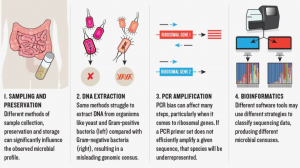29 7.3 – Clinical Efficacy and Standardizing Procedures
The study shows that a significant percentage of patients have achieved clinical remission and even more have attained clinical improvement within the first 90 days and that many of these patients were able to sustain their clinical remission or improvement through the 18 month long study. This shows the clinical efficacy of FMT in treating Crohn’s Disease when complicated with an inflammatory mass. While the traditional methods of treating Crohn’s Disease involved using an anti-TNF therapy or steroids, coupled with antibiotics, these techniques will usually require surgery to treat the inflammatory mass. Surgery can lead to complications like the recurrence of disease and short bowel syndrome. An FMT treatment can target the offending bacteria and decrease the inflammatory masses, as shown in their MRI scans, thus eliminating the need for surgery and treating Crohn’s Disease in a safe and effective way.
Question:
What are the advantages for utilizing FMT over surgery?
There are problems however with the methodology of the experiment with the major concern being how an FMT experiment is conducted. Currently, there is no standard procedure. This means that it is up to the researcher’s discretion on how to collect and store their samples and how to analyze the composition of their microbiota. Differences in techniques can change the profile of the microbiota or what we are able to see in our analysis which can lead to discrepancies when comparing experiments with different researchers. A past study done by Suskind showed a 77.8% remission rate with patients with CD after 2 weeks. The author’s previous research showed that there was a 76.7% remission rate after 1 month of FMT for those with Crohn’s Disease. However, this current study shows a 52% clinical remission rate after 1 month. The variability in research protocols has resulted in different experiments and ultimately different results which may conflict with each other. This also raises questions on the true effectiveness of FMT given that results are not easily reproducible. Scientists have addressed the major differences in the procedures of a fecal microbiota and are looking for ways to standardize procedures. If we can create a standardized protocol on fecal microbiota experiments, it could help to validate future projects in the realm of FMT.

Figure 3.
The ways procedures may vary between experiments, which can create different results. (Zymo Research 2018).
Question:
Why is it important to have standard procedures in experiments?
Thinking Question:
Why would scientists be so interested in using FMT to treat diseases?
